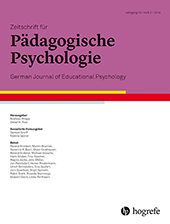Abstract
Abstract. For learners, motivational regulation represents a daily challenge in terms of initiating, increasing and maintaining motivation. Crucial here is conditional knowledge about which motivational regulation strategies are appropriate for which specific motivational problems. This paper addresses the relationships between this type of strategy knowledge and regulatory effectiveness and characteristics of learning behavior. In a sample of 188 undergraduates, this strategy knowledge – assessed with a newly developed Situational Judgement Test – showed moderately positive correlations with motivational regulation on the behavioral level. Moreover, it was positively related to the effectiveness of motivational regulation and effort. Hence, conditional motivational regulation strategy knowledge is relevant and contributes to an extended understanding of motivational regulation in the higher education context.
Zusammenfassung. Für Lernende ist Motivationsregulation, im Sinne der Initiierung, Steigerung und Aufrechterhaltung der Motivation eine alltägliche Herausforderung. Fundamental dafür ist das konditionale Wissen darüber, welche Motivationsregulationsstrategien bei welchen konkreten Regulationsanlässen funktional sind. Die vorliegende Arbeit untersucht Zusammenhänge dieser Art des Strategiewissens mit Regulationserfolg und Merkmalen des Lernverhaltens. Anhand einer Stichprobe von 188 Studierenden konnte gezeigt werden, dass dieses Strategiewissen – erfasst mittels eines neu konstruierten Situational Judgement Tests – moderat positiv mit Motivationsregulation auf Verhaltensebene, mit Regulationserfolg und mit Anstrengung korreliert. Somit ist konditionales Strategiewissen zur Motivationsregulation von Relevanz und leistet einen Beitrag zum erweiterten Verständnis von Motivationsregulation im Hochschulkontext.
References
(2018). Interrelations between motivational regulation, procrastination and college dropout intentions. Unterrichtswissenschaft, 46, 461 – 479 .
(1999). Self-regulated learning: Where we are today. International Journal of Educational Research, 31, 445 – 457.
(2015). Competencies for successful self-regulated learning in higher education: Structural model and empirical evidence from expert interviews. Studies in Higher Education, 40, 454 – 470.
(2015). Wie spezifisch regulieren Studierende ihre Motivation bei unterschiedlichen Anlässen? Ergebnisse einer Interviewstudie, [How specifically do students regulate their motivation in different situations? Results from an interview study]. Zeitschrift für Entwicklungspsychologie und Pädagogische Psychologie, 47, 14 – 23. https://doi.org/10.1026/0049-8637/a000120.
(2016). Effectiveness of motivational regulation: Dependence on specific motivational problems. Learning and Individual Differences, 52, 72 – 78. https://doi.org/10.1016/j.lindif.2016.10.011.
(2017). Quantity and quality of motivational regulation among university students. Educational Psychology, 37, 1154 – 1170. https://doi.org/10.1080/01443410.2017.1322177.
(2013). Assessing metacognitive knowledge: Development and evaluation of a test instrument. Journal for Educational Research Online, 5, 162 – 188.
, & (2006): Kompetenzmodelle zur Erfassung individueller Lernergebnisse und zur Bilanzierung von Bildungsprozessen. Beschreibung eines neu eingerichteten Schwerpunktprogramms der DFG [Competency models for measuring individual learning and for evaluating education processes: Description of a newly established Priority Program oft he DFG]. Zeitschrift für Pädagogik, 52, 876 – 903.
(2001). Studierende können lernen, sich selbst zum Lernen zu motivieren: Ein Trainingsexperiment, [Students can learn to motivate themselves to learn: A training experiment]. Zeitschrift für Pädagogische Psychologie, 15, 155 – 167.
(2013). Reliability and validity analyses of a newly developed test to assess learning strategy knowledge. Journal of Cognitive Education and Psychology, 12, 391 – 408.
(2012). Mplus7 [Computer Software]. Los Angeles, CA: Muthén & Muthén.
(1983). Becoming a strategic reader. Contemporary Educational Psychology, 8, 293 – 316.
(2004). Missing data in educational research: A review of reporting practices and suggestions for improvement. Review of Educational Research, 74, 525 – 556.
(2000).
Assessing metacognition and self-regulated learning . In G. SchrawJ. C. Impara (Eds.), Issues in the measurement of metacognition (pp. 43 – 97). Lincoln, NE: Buros Center for Testing.(1996). Cultural differences in the use of strategies for self- regulated learning. American Educational Research Journal, 4, 845 – 871.
(1992). Once a boring task always a boring task? Interest as a self-regulatory mechanism. Journal of Personality and Social Psychology, 63, 379 – 390.
(2007). WLST 7 – 12. Würzburger Lesestrategie-Wissenstest für die Klassen 7 bis 12, [Würzburg Reading Strategy Knowledge Test for grades 7 to 12]. Göttingen, Germany: Hogrefe.
(2006). New perspectives for the evaluation of training sessions in self-regulated learning: Time-series analyses of diary data. Contemporary Educational Psychology, 31, 64 – 96.
(2002). Skalen zur Erfassung des schulischen Selbstkonzepts (SESSKO) [School-Related Self Concept Scales]. Göttingen, Germany: Hogrefe.
(2007). Strategien zur Motivationsregulation und ihre Erfassung [Strategies for motivational regulation and assessment]. Zeitschrift für Entwicklungspsychologie und Pädagogische Psychologie, 39, 57 – 69.
(2009). How do motivational regulation strategies affect achievement: Mediated by effort management and moderated by intelligence. Learning and Individual Differences, 19, 621 – 627.
(2002). Skalen zur Erfassung der Lern- und Leistungsmotivation (SELLMO) [Learning and achiemement motivation scales]. Göttingen, Germany: Hogrefe.
(2011). Diagnose und Relevanz des Wissens über Strategien zur Motivationsregulation [Diagnosis and relevance of knowledge about motivational regulation strategies]. Presentation at the biannual meeting of the section “Educational Psychology” of the German Psychological Society in Erfurt, Germany.
(Eds.) (2006). Situational judgment tests. London, UK: Lawrence Erlbaum.
(1995).
Structural equation models with non-normal variables: Problems and remedies . In R. Hoyle (Ed.), Structural equation modeling: Concepts, issues, and applications (pp. 56 – 75). Thousand Oaks, CA: Sage.(2008). Self-regulated learning as a competence: Implications of theoretical models for assessment methods. Zeitschrift für Psychologie / Journal of Psychology, 216, 102 – 110.
(1998). Self-regulated learning and college students' regulation of motivation. Journal of Educational Psychology, 90, 224 – 235.
(1999). The relation between high school students' motivational regulation and their use of learning strategies, effort, and classroom performance. Learning and Individual Differences, 11, 281 – 299.
(1990). Student differences in self-regulated learning: Relating grade, sex, and giftedness to self-efficacy and strategy use. Journal of Educational Psychology, 82, 51 – 59.



